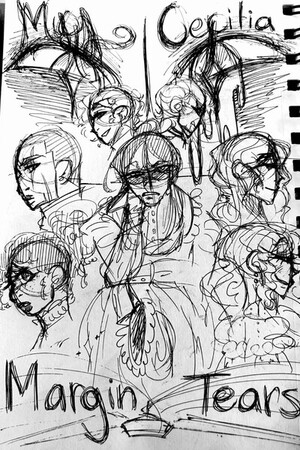Chapter 14:
The Veteran
Margin Tears: My Cecilia
It was one thing after another, no real rhyme or reason to the flow of her work tasks, just following the whims of the story’s needs. Cecilia labored through the morning, afternoon, and well into the evening, rolling with whatever punches were aimed at her. She could not begin to guess where each new task would bring her, what each chapter of this story had in store next. But for now, she was brought to the great hall, already swollen with voices, the clatter of porcelain teacups, and the faint, polite laughter of aristocrats rehearsing their roles for the evening. She moved as always through that noise, a silent fixture in black and white uniform, bearing trays and opening doors, acting as nothing more than a shadow among velvet gowns and polished boots.
It was then she noticed him, another rare face in the crowd.
He had arrived without fanfare, though Lord Olrin had greeted him personally at the threshold with a clasp of hands and a declaration of brotherhood forged in the chaos of war—a decorated veteran of the recent war Cecilia had only just picked up on. The man standing beside him looked to be little older than myself, perhaps nearing thirty, but time had held him in too tightly a grip. His uniform had been exchanged for a simple dark coat, civilian clothes that hung on him like an ill-fitting disguise. His posture was upright, yet his shoulders carried a heaviness that refused to settle. His head was shaved bald, just like his face, and the dark of his complexion was rivaled only by the shadow cast over his eyes.
He did not smile. Not once.
When the lord introduced him to a cluster of guests—the revered Colonel Nero—describing his service and his honors, she noticed the veteran’s jaw tighten. Praise rolled off him like water striking stone, unwanted, unabsorbed. His gaze drifted not to those who lauded him, but to the tall windows beyond them—the grey sky, the skeletal trees waving outside as if more familiar company than any person here.
His eyes—grey as musket smoke and just as cloudy—barely swept the room. He seemed to be there not as a guest but as a required presence, as though his invitation had been an obligation too great to decline. While the other men spoke of hunts and horses, postures proud and hands speaking more vividly than mouths ever could, he stood like a statue among them, neither drawn to their camaraderie nor pushing it away. It was like he was simply enduring.
Drawn again to another miserable face in the house, Cecilia passed near with her trusty tray, this time bearing offerings of ruby wine.
Ready hands absentmindedly took flutes at once, swirling the liquid as they continued talking. He, however, did not take a glass. He did not even look at her, but she felt his silence wrap the air like a cloak. It was not rudeness, but a quiet that made the surrounding chatter sound shrill and meaningless.
Later, when Cecilia set down the decanter at the sideboard, she caught a clearer, closer glimpse of him. The lamplight revealed stress lines etched around his mouth, aging him beyond his years alongside scars both faint and serrated that trailed from across his temple, through his left eye, and down under his chin. Hands honed by the heft of sabers and rifles now curled stiffly at his sides, as though uncertain what to do when left empty.
They were strangers, separated by more than just status and experience, but something in her recognized him.
That way of standing apart even when the world pressed you close.
That role scripted just for you, to perfectly fill an archetype to keep the story moving forward.
That refusal to soften yourself for others’ ease.
They did not speak. He did not notice her beyond the periphery of his silence; she had finally become one of the crowd, and for the first time she wondered if she, too, seemed faceless within the manor. But she still carried his image with her through the rest of the evening: the quiet soldier who had survived the roar of cannons only to find himself marooned in the clamor of a ballroom.
It should have been a celebration, a victory, but it was rarely so simple.
…
She found him again later, though “found” was too deliberate a word. He was simply there—drawn, it seemed, to the less-trodden corners of the manor where the walls did not echo so much. The garden doors had been left ajar, and in the moment between duties, checking once over each shoulder for any watching stragglers, she slipped through them with a tray of discarded glasses.
The cold air, delivered in harsh gusts, struck like arrows in the night. Outside, away from candles and perfumes, the dusk had swallowed the grounds whole. And there he stood at the stone balustrade, his profile turned to the manicured lawn, the shadows carving hollows into his cheek.
Cecilia started to second guess her following her; it felt intrusive, maybe even creepy to be watching this man under the cover of night. Before she could turn tail and return to the exposure of candle and crystal, though, Nero spoke, low and flat.
“Do they always laugh so much here?”
His voice startled her more than the question. It was not unkind, only heavy, as though words themselves were burdens he preferred not to lift.
She stood there, hands clasped awkwardly together and unsure what to do. “Yes, sir,” she answered, stepping closer, though she gave a wide berth between herself and the colonel so as not to intrude too much under the stars’ canopy. She shrugged as she added, “It’s to be expected.”
He huffed a short breath—perhaps amusement, perhaps disbelief. “Expected.” His eyes did not move from the horizon. “Strange thing, what we come to accept as such.”
A quiet stretched again. It may have been taken as a tense, even uncomfortable silence, but under the weight of black sky and cricket chirps, it felt more placid, tranquil, at peace. Most importantly, it did not feel dismissive; his stillness allowed her to stay, as if he had granted a permission wordlessly.
She took the allowance gratefully.
Minutes passed like seconds, the two enjoying the comfort of chilled night air and the nocturnal rustle of flora and fauna. Hours could have passed, and it still would have ended too soon. Nero’s eyes eventually shifted to look at Cecilia directly. They were sharper than they had been all night—Not piercing, but simply seeing her, allowing not only her but himself to be present.
“You’re not afraid of the quiet,” he said.
Cecilia sighed, the sound dragging roughly up her throat and off her tongue. “At this point, I welcome it,” she admitted, “Especially if it means nothing decides to take me by surprise.”
That earned the faintest shift of his mouth. It was not quite a smile, but a crease that might have once belonged to one.
“Then you are better suited to this life than I am.”
Before she could respond, footsteps from the hall spilled out into the garden, a no-longer-distant cacophony ringing on the wind. From out of sight, another guest called Nero’s title, prompting his back to straighten and his mask to slide back into place. He spared a final glance to Cecilia, then a nod, a turn, and he was gone, leaving only the sharp bite of the late-summer breeze and the echo of his words.
It was not much, hardly a conversation at all, but it was one of the deepest conversations she had had since arriving here, maybe even before that. It lingered even after Nero left. He was not merely a guest passing through. He was a man who had carried the battlefield inside him, and she felt it carried into these halls.




Please sign in to leave a comment.